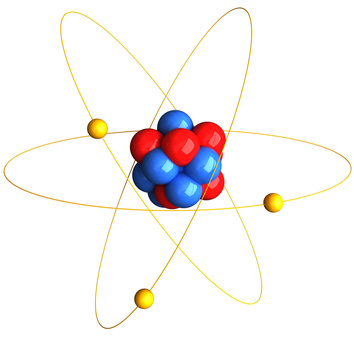Quantum Chromodynamics

One of the fundamental questions is: What is the world made of and what holds it together? (further reading) For this purpose, the properties of elementary particles (hadrons) are investigated using computer simulations. These theoretical results are needed to analyze some experiments as, for example, done at the Large Hadron Collider LHC at the CERN.
Strong forces are responsible for the binding of quarks and gluons to make e. g. protons and neutrons. The theory of strong interaction is called Quantum Chromodynamics (QCD). (further reading)
Computer simulations in QCD are based on the discretization of the theory on an Euklidean lattice. Here equations of motion, defined either via classical equations of motion (Hybrid Monte Carlo) or stochastic differential equations, have to be solved numerically. In both cases, the time integration has to be done in a non-abelian Lie group and causes a high computational effort. Moreover, these integration methods must be symmetric and symplectic to reflect realistic physical situations.
In our group, we investigate and enhance geometric numerical integration methods for differential equations in Lie groups. To speed up simulations and allow for larger lattices, we develop high-order implicit partitioned Runge-Kutta integrators and combine them with multirate schemes.
People in Group
- Michael Günther
- Matthias Ehrhardt
- Michele Wandelt
- Dmitry Shcherbakov
Cooperation
- Francesco Knechtli, Theoretische Teilchenphysik, Bergische Universität Wuppertal
- Mike Peardon, School of Mathematics, Trinity College Dublin
Ongoing projects
- SFB/Transregio 55 "Hadronenphysik mit Gitter-QCD", Project area B: Algorithms for Lattice QCD simulations.
- Marie Curie ITN STRONGnet "Strong Interaction Supercomputing Training Network " (01/2010 - 12/2014)
Literature
- Hairer, Lubich, Wanner: Geometric Numerical Integration - Structure-Preserving Algorithms for Ordinary Differential Equations, Springer Berlin, ISBN : 978-3-540-30663-4
- M. Wandelt, Master Thesis:
Implicit partitioned Runge-Kutta integrators for simulations of gauge theories - M. Striebel, M. Günther, F. Knechtli, M. Wandelt: Accuracy of Symmetric Partitioned Runge-Kutta Methods for Differential Equations on Lie-Groups PoS Lattice2011 (2011)
- M. Wandelt, M. Günther, F. Knechtli, M. Striebel : Symmetric Partitioned Runge-Kutta Methods for Differential Equations on Lie Groups (appears in) Appl. Num. Math.
- D. Shcherbakov and M. Ehrhardt: Multistep Methods for Lattice QCD Simulations , Proceedings of LATTICE 2011 - XXIX International Symposium on Lattice Field Theory, July 10-16, 2011, Squaw Valley, Lake Tahoe, California, USA. Proceedings of Science PoS (Lattice 2011), 327-333.
- D. Shcherbakov, M. Ehrhardt, M. Günther and M. Peardon: Force-Gradient Nested Multirate Methods for Hamiltonian Systems, Preprint 13/?, November 2013.
